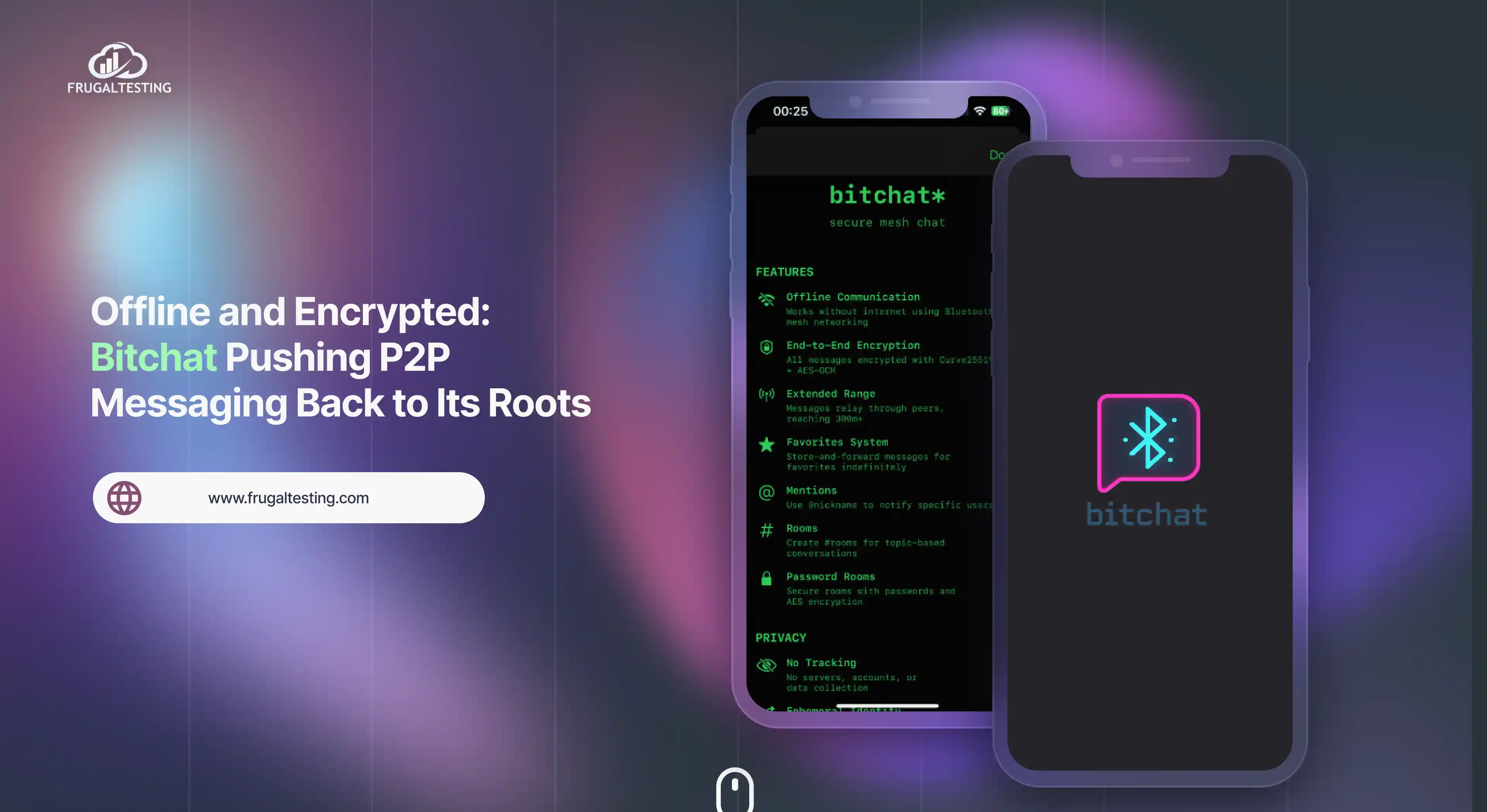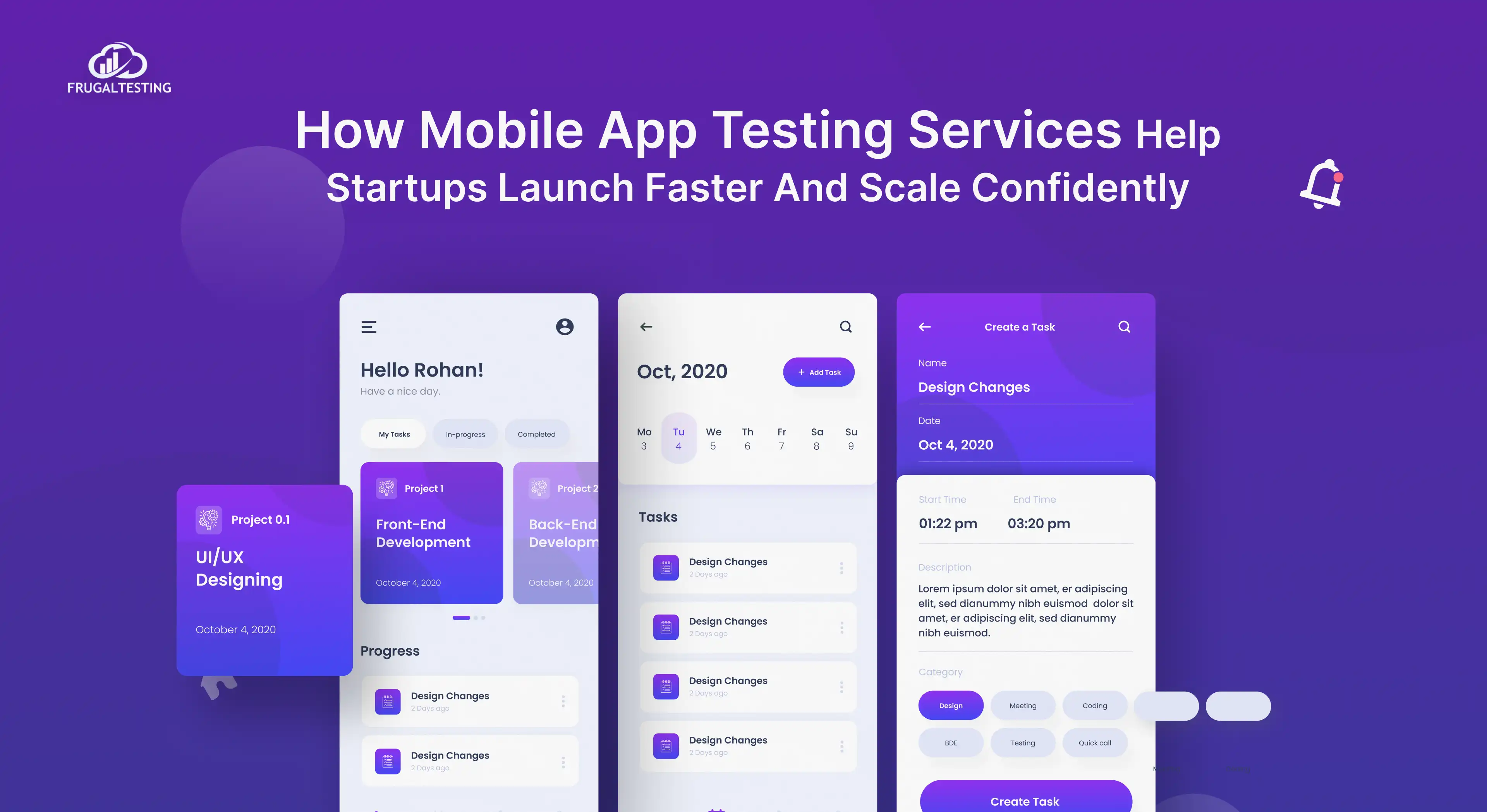Traditional testing techniques frequently fall short in the dynamic field of software testing. This is where AI-powered tools revolutionize the software testing process, bringing unmatched efficiency, precision, and speed. 🚀 By reducing manual efforts and eliminating human errors, AI enhances testing, ensuring high-quality software products that exceed user expectations. 🌟 Discover how AI is shaping the future of software testing, driving innovation, and setting new standards in the industry.
Key Takeaways:
📌 Evolution of Software Testing: From manual to AI-driven methods.
📌 AI in Testing Methodologies: Improved efficiency in various testing types.
📌 AI-Powered Tools: Leading tools transforming the testing landscape.
📌 Challenges and Solutions: Addressing common challenges in AI testing.
📌 Future Trends: The evolving role of AI in software testing.
Understanding Software Testing and Its Evolution
Software testing is a crucial phase in the software development lifecycle (SDLC), ensuring that software is functional and meets high-quality standards. The traditional approaches to testing, relying heavily on manual testing efforts, can be slow, error-prone, and resource-intensive.
The Evolution of Software Testing
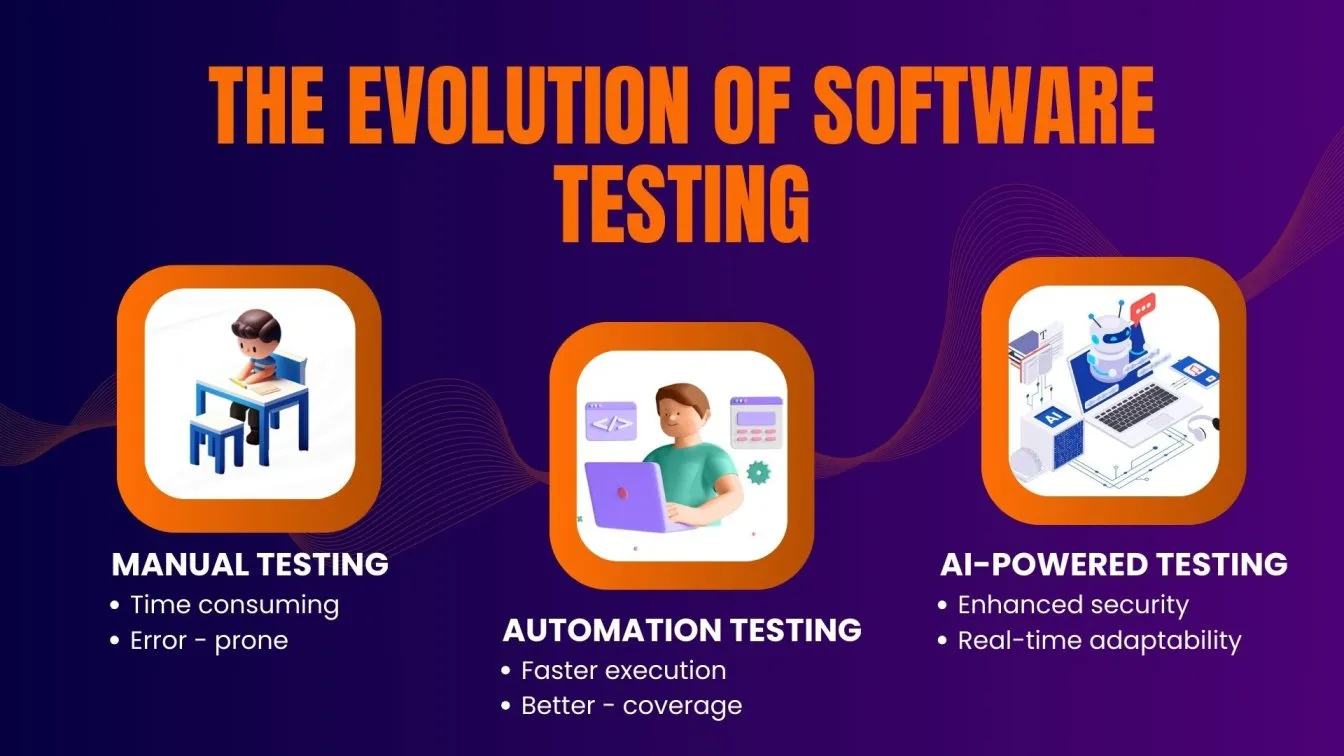
- Manual Testing Era:
- Characteristics: Relied on human testers, time-consuming, prone to manual errors.
- Challenges: Limited coverage, high costs, complex system management.
- Automated Testing Introduction:
- Characteristics: Tools like Selenium and QTP automated repetitive tasks.
- Advantages: Faster execution, better coverage, consistent results.
- Limitations: High setup costs, maintenance issues, limited adaptability.
- AI-Driven Software Testing:
- Characteristics: Uses AI and machine learning for test case generation and anomaly detection.
- Advantages: Improved accuracy, real-time adaptability, and data-driven insights.
- Future Potential: Integration with DevOps/CI/CD, advanced predictive analytics, and autonomous testing.
Diving into Software Testing Methodologies
Understanding various testing methodologies is essential to effectively leverage AI in software testing. Here’s a detailed look:
- Functional Testing 🧩
- Purpose: Validates that the software works as intended.
- Examples: Unit testing, integration testing, system testing.
- AI Application: Automates functional test case generation and execution.
- Non-functional Testing ⚙️
- Purpose: Evaluate the software’s performance, security issues, and usability.
- Examples: Load testing, security testing, usability testing.
- AI Application: Predictive analytics for performance bottlenecks and security vulnerabilities.
- Regression Testing 🔄
- Purpose: Ensures new changes do not affect existing functionalities.
- AI Application: Enables intelligent test case selection and impact analysis.
- Acceptance Testing 🎯
- Purpose: Verifies that the software meets business requirements and user expectations.
- AI Application: Automates user scenario testing based on real user data.
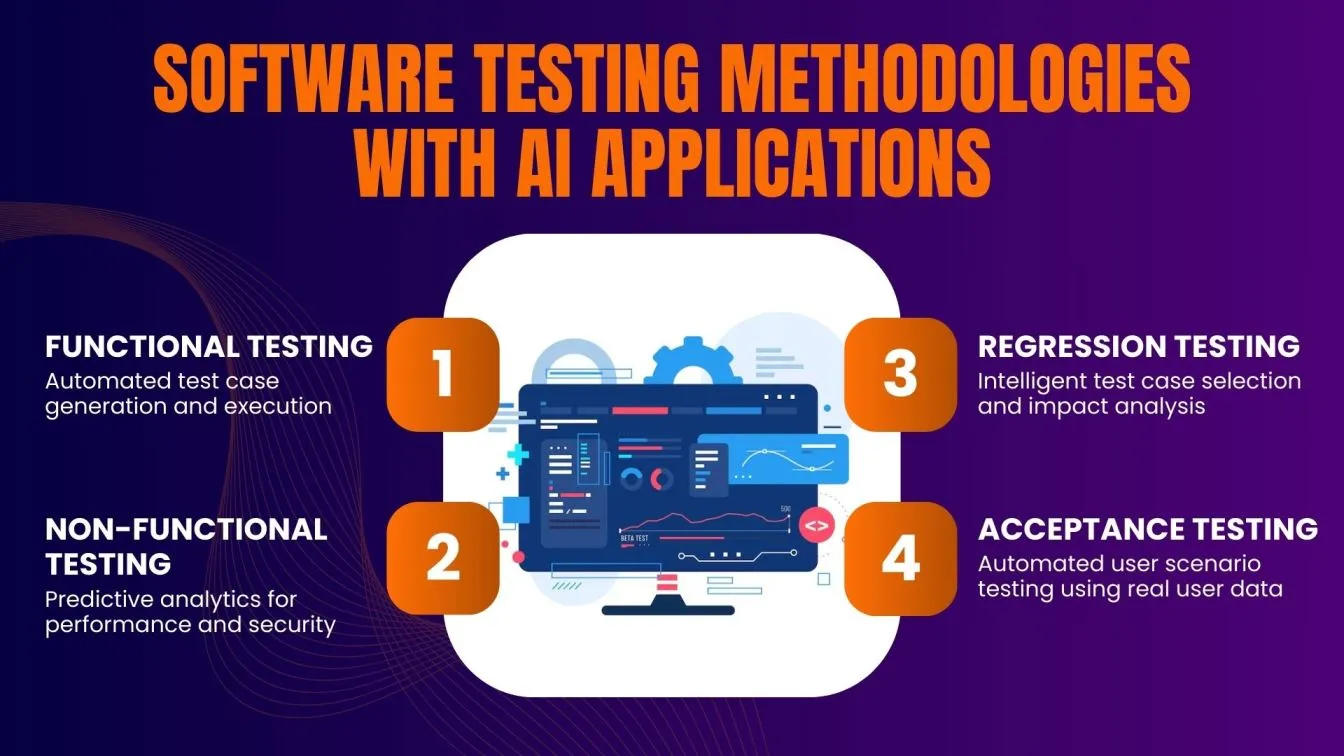
AI’s Role in Testing Methodologies
- Automated Test Case Generation: AI analyzes code and user behavior to automatically create relevant test cases.
- Optimized Test Coverage: AI identifies critical areas to ensure comprehensive testing.
- Enhanced Defect Detection: AI uses historical data and patterns to predict and identify defects more accurately.
- Adaptive Testing: AI adjusts testing strategies in real-time based on application changes or user interactions.
Agile Methodologies and AI in Testing
In Agile environments, where speed and flexibility are crucial, AI integration in testing enhances iterative development, continuous feedback, and rapid releases.
How AI Enhances Agile Testing
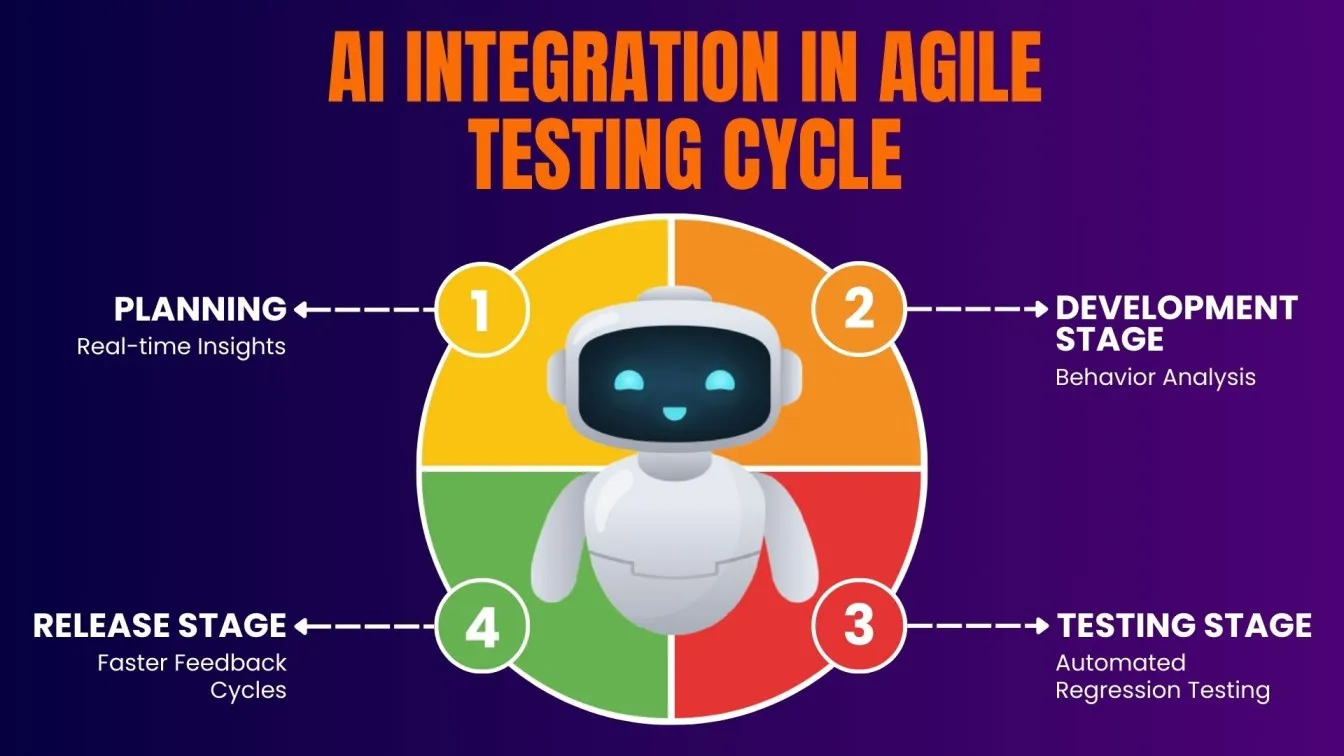
- Real-time Insights📈
- Continuous Feedback: AI offers immediate feedback on code quality and test results for quick adjustments.
- Data-Driven Decisions: AI analytics prioritize testing based on real-time data.
- Automated Regression Testing🔁
- Efficient Updates: Automatically run regression tests after each change to catch new bugs.
- Consistency: Ensures consistent testing standards across updates.
- Efficient User Interaction Testing👥
- Behavior Analysis: AI simulates realistic user interactions by analyzing behavior patterns.
- Adaptive Testing: Adjusts scenarios based on evolving user interactions and feedback.
AI-Powered Tools: Revolutionizing the Testing Ecosystem
AI-powered tools are revolutionizing software testing by using machine learning and data analytics to make testing more efficient and effective.
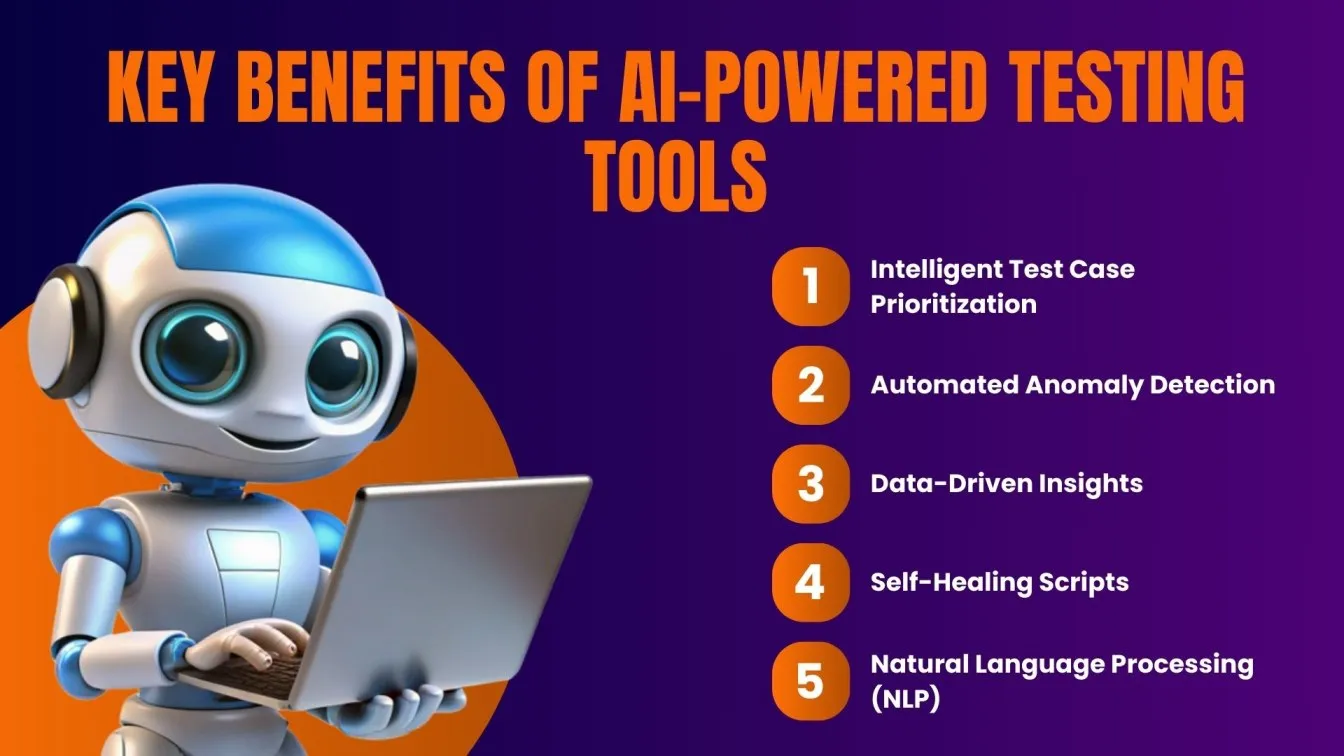
What AI-Powered Tools Bring to the Table
- Intelligent Test Prioritization: AI ranks test cases by risk, ensuring critical tests run first to optimize efforts.
- Automated Anomaly Detection: AI spots defects through patterns missed in manual testing, boosting reliability.
- Data-Driven Insights: AI provides actionable insights, refining testing frameworks and strategies.
- Self-Healing Scripts: AI adapts comprehensive test scripts to changes in the application, reducing maintenance for testing teams.
- NLP-Driven Test Cases: AI translates natural language requirements into test cases, enhancing coverage of user stories.
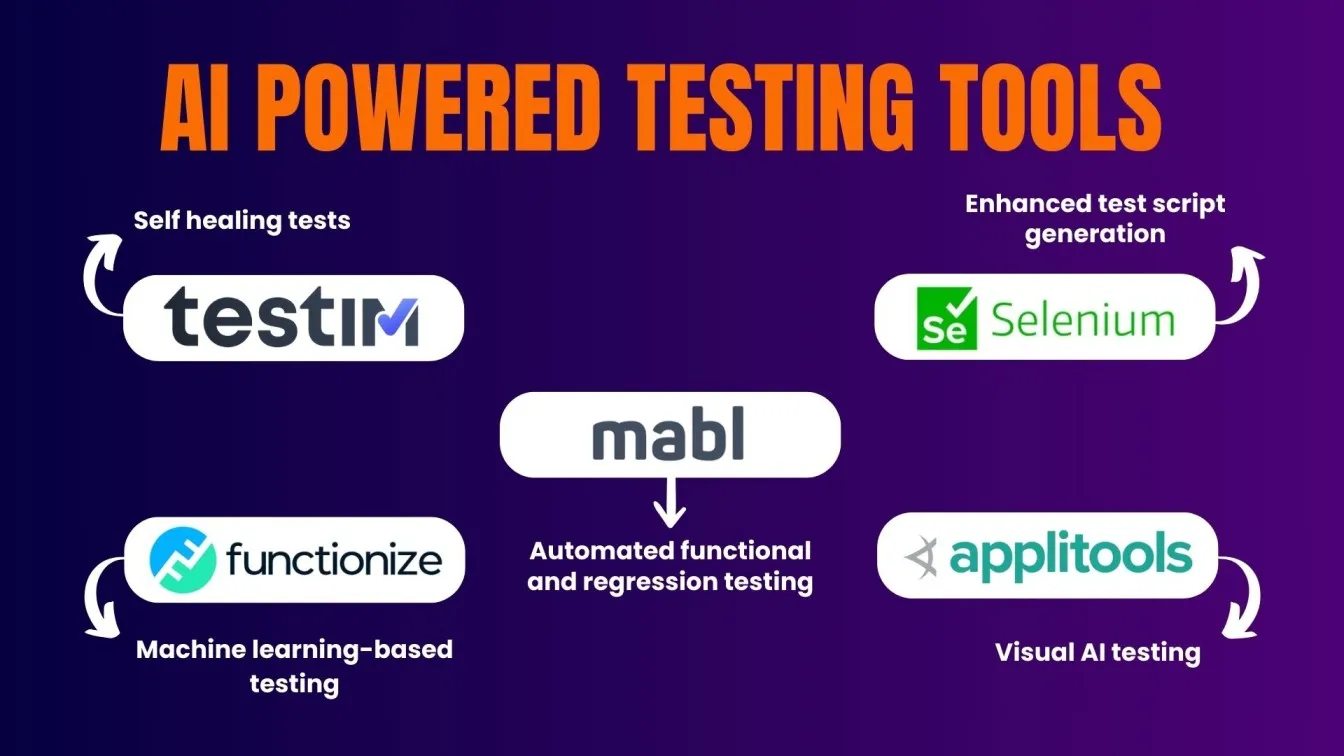
AI-powered tools are transforming testing by improving efficiency and accuracy. Below are key AI tools reshaping the industry:
Understanding Different Types of Software Testing with AI
AI enhances all types of software testing, improving efficiency, accuracy, and coverage. Here’s how AI transforms each type:
- Unit Testing🧩
- Traditional: Manually creating test cases for each unit.
- AI Enhancement: Prioritizes critical units for testing and automatically generates comprehensive test cases.
- Integration Testing🔗
- Traditional: Manual testing of integrated unit interactions.
- AI Enhancement: Simulates integration scenarios and manages module dependencies effectively.
- System Testing🖥️
- Traditional: Manual validation of the entire system's functionality.
- AI Enhancement: Automates end-to-end testing and continuously monitors system performance.
- Acceptance Testing🎯
- Traditional: Manual testing based on user stories and requirements.
- AI Enhancement: Simulates realistic user scenarios and automates requirement validation.
- Performance Testing🚀
- Traditional: Manual setup of performance tests.
- AI Enhancement: Predicts system performance under various loads and dynamically simulates user loads.
- Security Testing🔒
- Traditional: Manual identification of vulnerabilities.
- AI Enhancement: Automatically detects vulnerabilities and simulates cyber-attack scenarios.
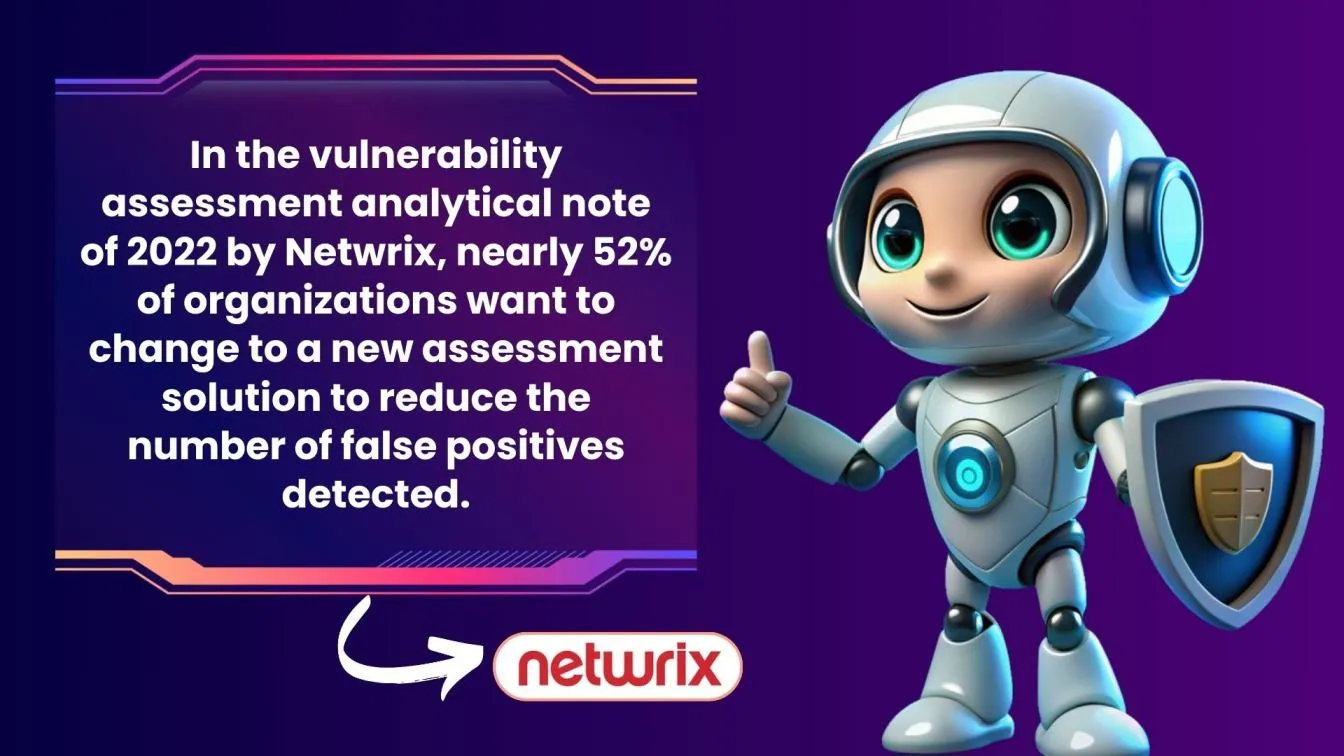
AI for Regression Testing: Accuracy Meets Speed
Regression testing ensures new code changes do not disrupt existing features. AI enhances this process by addressing common challenges:
Challenges with Manual Regression Testing
- Time-Intensive: Requires significant resources and time.
- Repetitive: Leads to tester fatigue from running the same tests repeatedly.
- Risk of Missing Defects: Tight deadlines can result in overlooked issues.
AI Solutions for Regression Testing
- Automated Test Case Selection🤖
- How It Works: AI selects relevant test cases based on code changes.
- Benefits: Saves time and resources and enhances efficiency.
- Impact Prediction🔍
- How It Works: AI predicts affected areas of the software.
- Benefits: Focuses testing on high-risk areas, improving defect detection.
- Faster Execution⚡
- How It Works: AI accelerates testing by optimizing test flows.
- Benefits: Speeds up release cycles without quality compromise.
- Continuous Learning📈
- How It Works: AI refines future tests based on past results.
- Benefits: Enhances regression testing accuracy and efficiency over time.
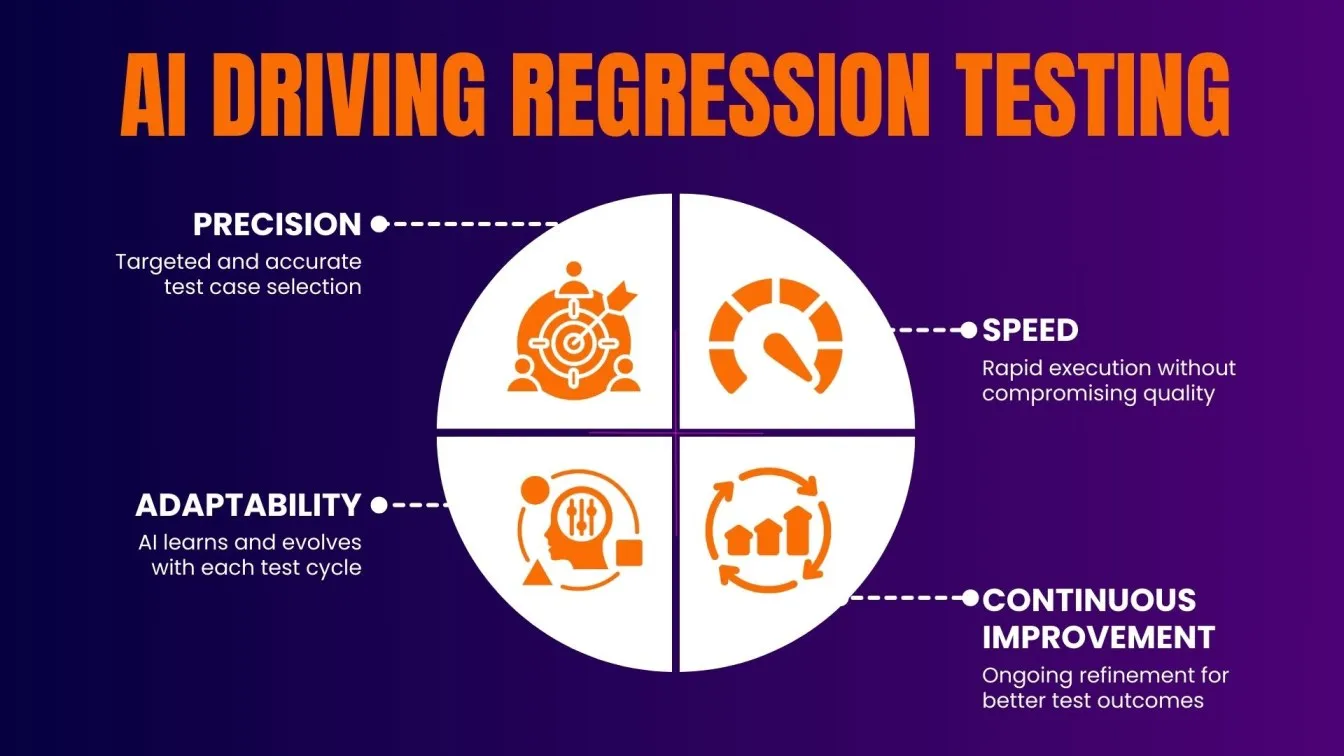
AI in Continuous Testing: Streamlining CI/CD Pipelines
CI/CD pipelines demand constant testing to ensure reliable and swift updates. AI boosts continuous testing efficiency:
Continuous Testing in CI/CD Pipelines
- Definition: Automated testing processes within CI/CD pipelines ensure prompt code change testing.
- Importance: Maintains software quality and speeds up release cycles by catching issues early.
AI’s Role in Continuous Testing
- Automating Test Execution 🤖
- How It Works: AI runs test cases automatically with new code commits.
- Benefits: Reduces manual effort, and ensures consistency.
- Real-time Feedback 📊
- How It Works: AI provides immediate code quality insights.
- Benefits: Enables prompt issue resolution.
- Intelligent Test Prioritization 🔍
- How It Works: AI prioritizes tests based on impact and defect history.
- Benefits: Focuses on critical areas for better defect detection.
- Predictive Analytics 🔮
- How It Works: AI analyzes trends to foresee potential failures.
- Benefits: Proactively addresses issues before they escalate.
Benefits of AI in CI/CD:
- Enhanced Efficiency: Automates repetitive tasks, speeding up pipelines.
- Improved Quality: Ensures thorough testing, maintaining high standards.
- Faster Time-to-Market: Reduces testing bottlenecks.
- Proactive Issue Resolution: Identifies issues before they affect users.
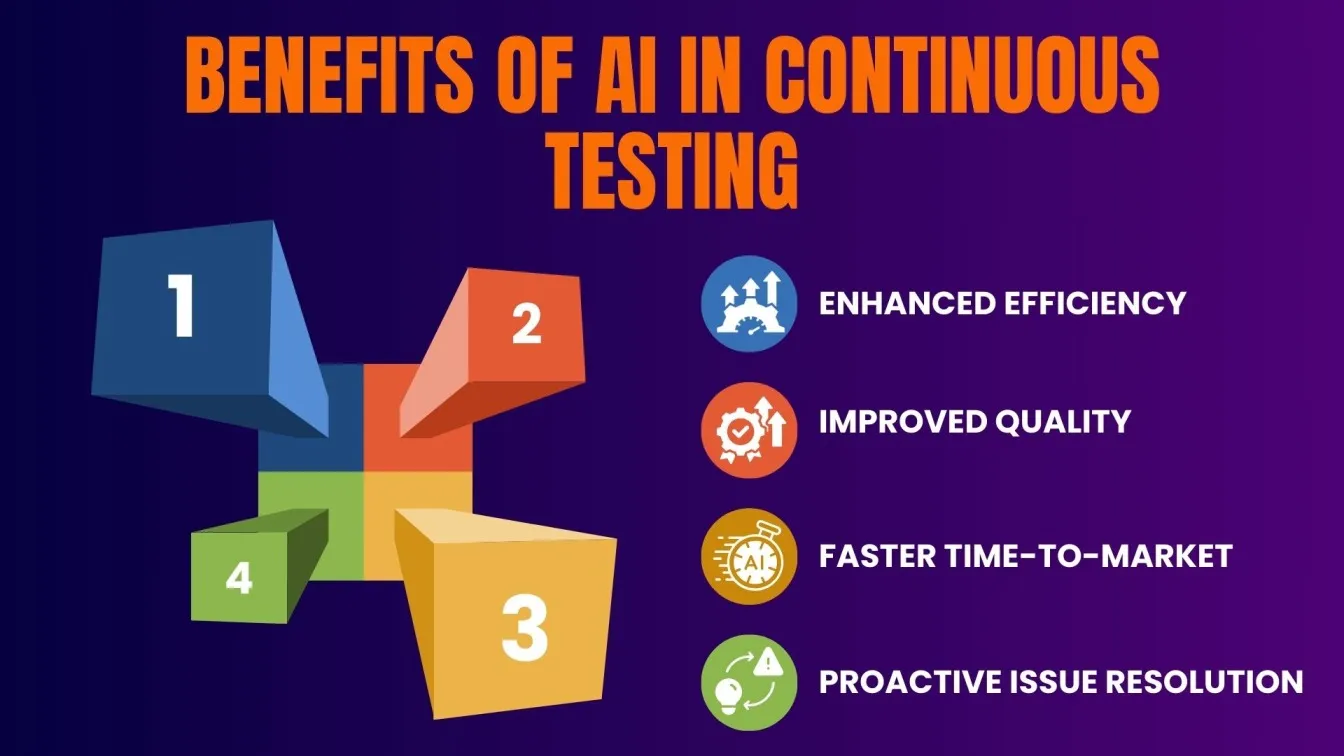
Benefits of AI in Continuous Testing
Best Practices for Implementing AI in Software Testing
Successfully integrating AI into your testing requires these best practices:
Steps to Seamless AI Integration
- Choose the Right Tools🛠️
- Assessment: Evaluate tools based on testing needs and infrastructure.
- Compatibility: Ensure integration with existing tech.
- Define Clear Objectives🎯
- Goal Setting: Identify what you want to achieve with AI.
- Measurable Metrics: Set metrics to assess AI success.
- Train Your Team👩💻👨💻
- Skill Development: Provide training for effective AI tool use.
- Knowledge Sharing: Foster continuous learning.
- Monitor and Optimize📊
- Performance Tracking: Assess AI tool performance against objectives.
- Iterative Improvements: Adjust based on feedback.
Additional Best Practices
- Start Small: Begin with pilot projects to gauge AI tools.
- Collaborate with Stakeholders: Engage all relevant parties for support.
- Ensure Data Quality: Invest in data management for effective AI training.
- Maintain a Balanced Approach: Use AI to complement manual testing.
Common Pitfalls to Avoid
- Overlooking Data Privacy: Ensure compliance with privacy regulations.
- Neglecting Maintenance: Regularly update AI tools.
- Underestimating Complexity: Plan for the complexity of AI implementation.
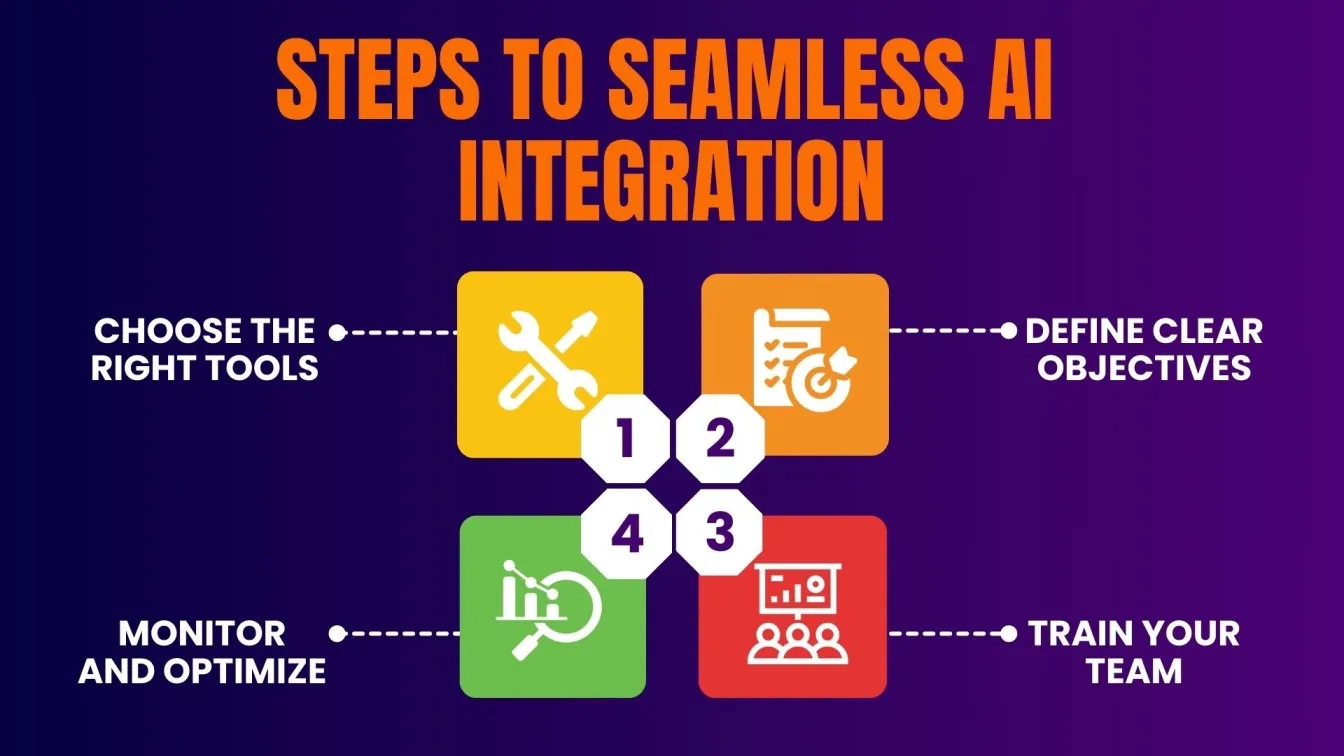
Automating Test Case Generation with AI
AI simplifies test case generation, enhancing both efficiency and accuracy.
How AI Automates Test Case Generation
- Automating the Process📝
- Data-Driven Generation: AI uses real-world data to create relevant test cases.
- Scenario Simulation: Generates diverse scenarios mimicking user behavior.
- Improving Efficiency⚡
- Speed: Quickly generates large volumes of test cases.
- Accuracy: Ensures precision, minimizing missed scenarios.
Benefits of Automated Test Case Generation
- Comprehensive Coverage: Tests all possible use cases.
- Consistency: Maintains uniform test case creation.
- Resource Optimization: Frees up testers for complex tasks.
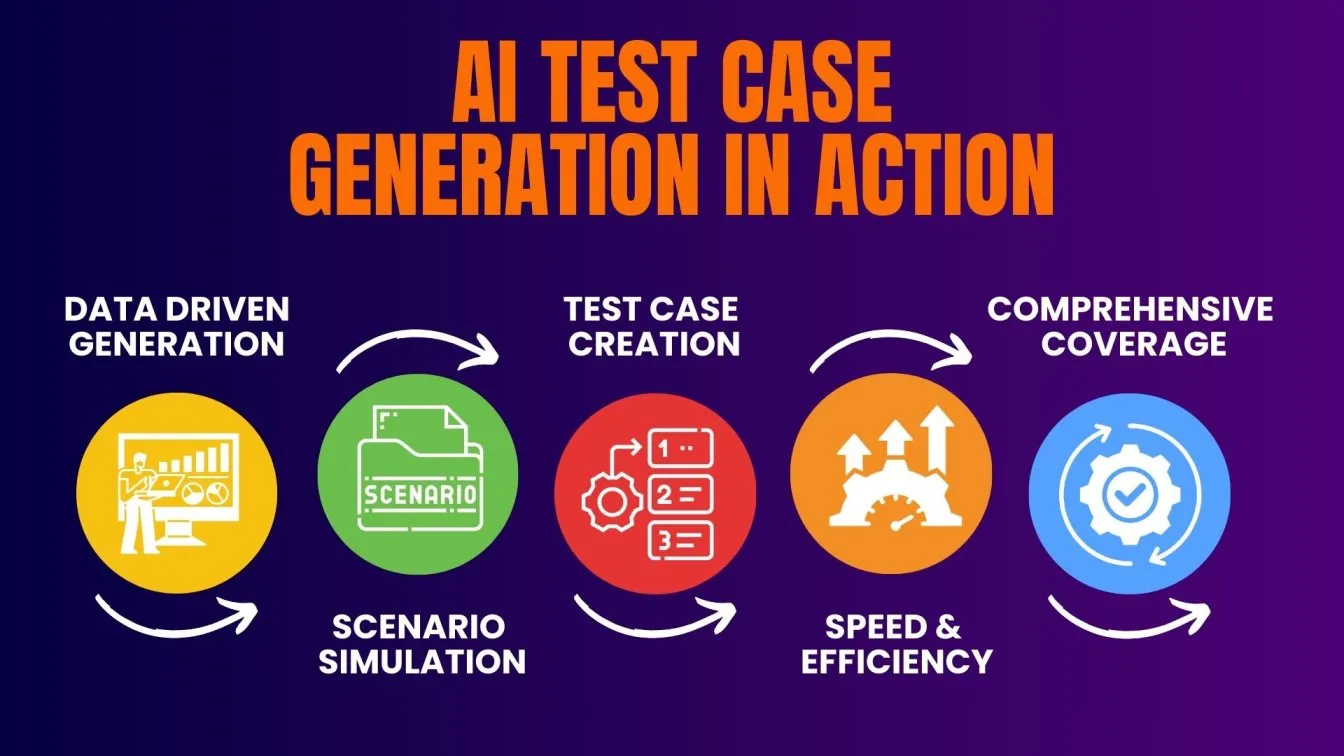
AI-Driven Bug Detection and Resolution
AI accelerates and refines bug detection and resolution.
How AI Enhances Bug Detection and Resolution
- Predictive Bug Detection 🔍
- Historical Data Analysis: Predicts where new bugs may occur.
- Pattern Recognition: Identifies recurring defect patterns.
- Automated Debugging 🔧
- Root Cause Analysis: Pinpoints bug causes for faster fixes.
- Suggested Fixes: Provides potential solutions based on past fixes.
- Reduced Manual Debugging Efforts 🛠️
- Automated Reports: Generates detailed bug reports.
- Prioritization: Prioritizes bugs according to their severity and impact.
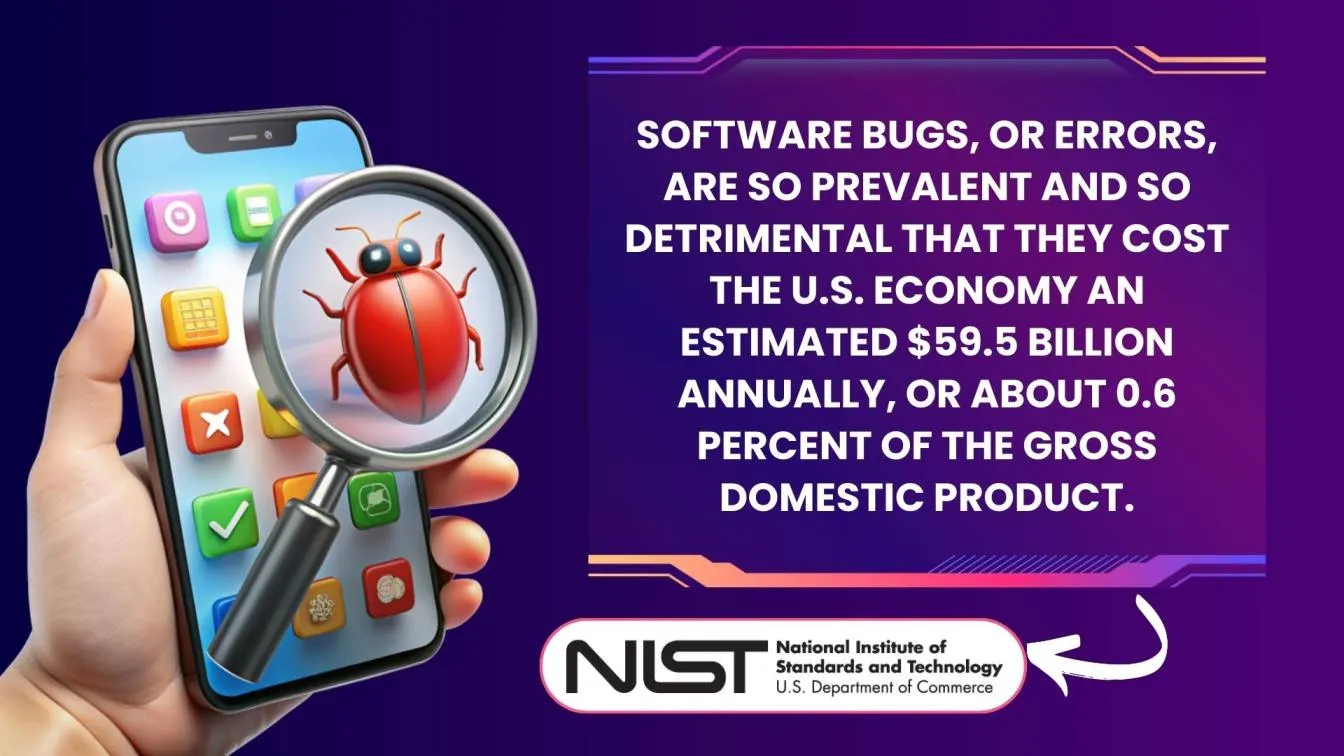
Benefits of AI-Driven Bug Detection
- Faster Identification: Quickly isolates bugs.
- Higher Accuracy: Reduces false positives.
- Efficient Resolution: Streamlines the debugging process.
Challenges and Considerations in AI-Based Software Testing
While AI has various benefits, it also poses its own set of obstacles. Recognizing and resolving issues is critical for successful implementation.
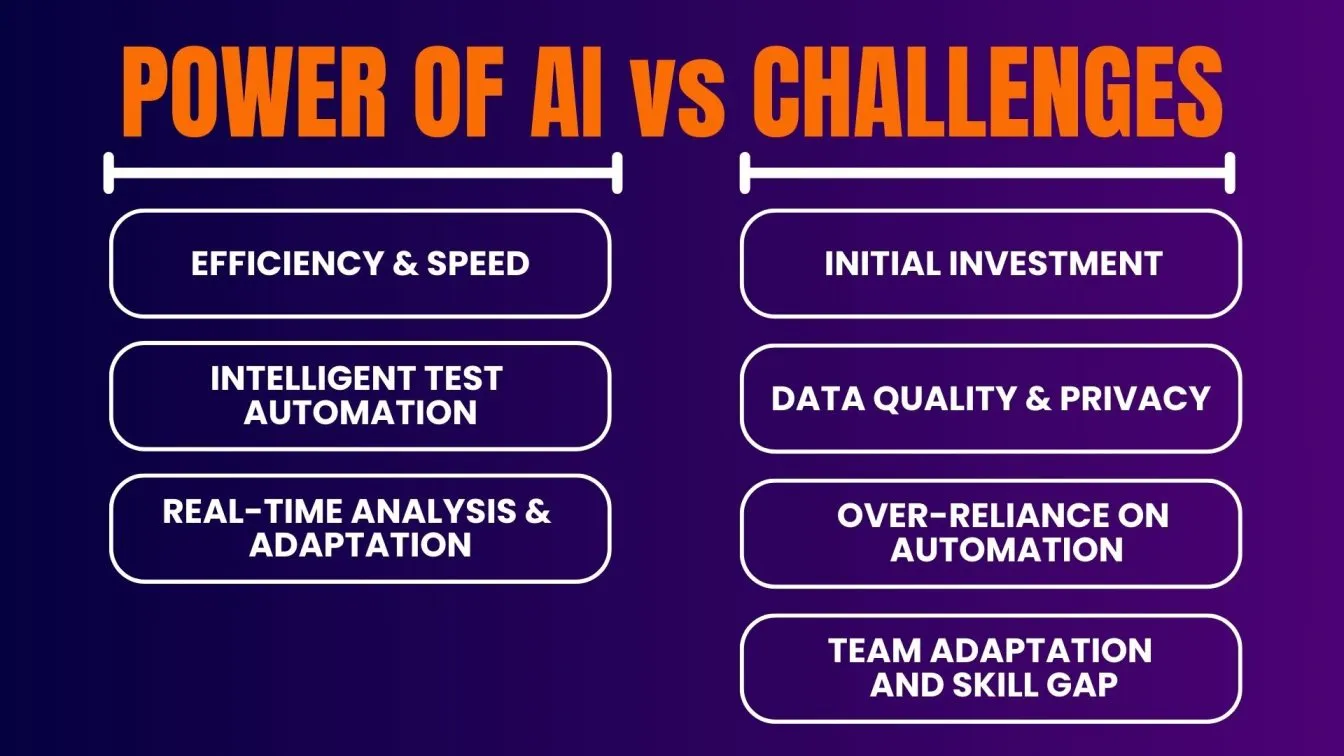
Common Challenges
- Initial Investment 💰
- Tool Costs: AI testing solutions can be expensive.
- Training Expenses: Proper training is essential for effective use.
- Data Quality and Privacy 🔒
- Data Accuracy: AI effectiveness depends on high-quality data.
- Privacy Concerns: Ensure compliance with privacy regulations.
- Over-Reliance on Automation ⚠️
- Loss of Human Insight: AI might overlook subtleties that humans can catch.
- Balanced Testing: Combine AI with manual testing for thorough coverage.
- Team Adaption and Skill Gap 🛠️
- Change Management: Teams may resist moving from traditional methods to AI.
- Skill Gaps: Current team members may lack AI and machine learning expertise.
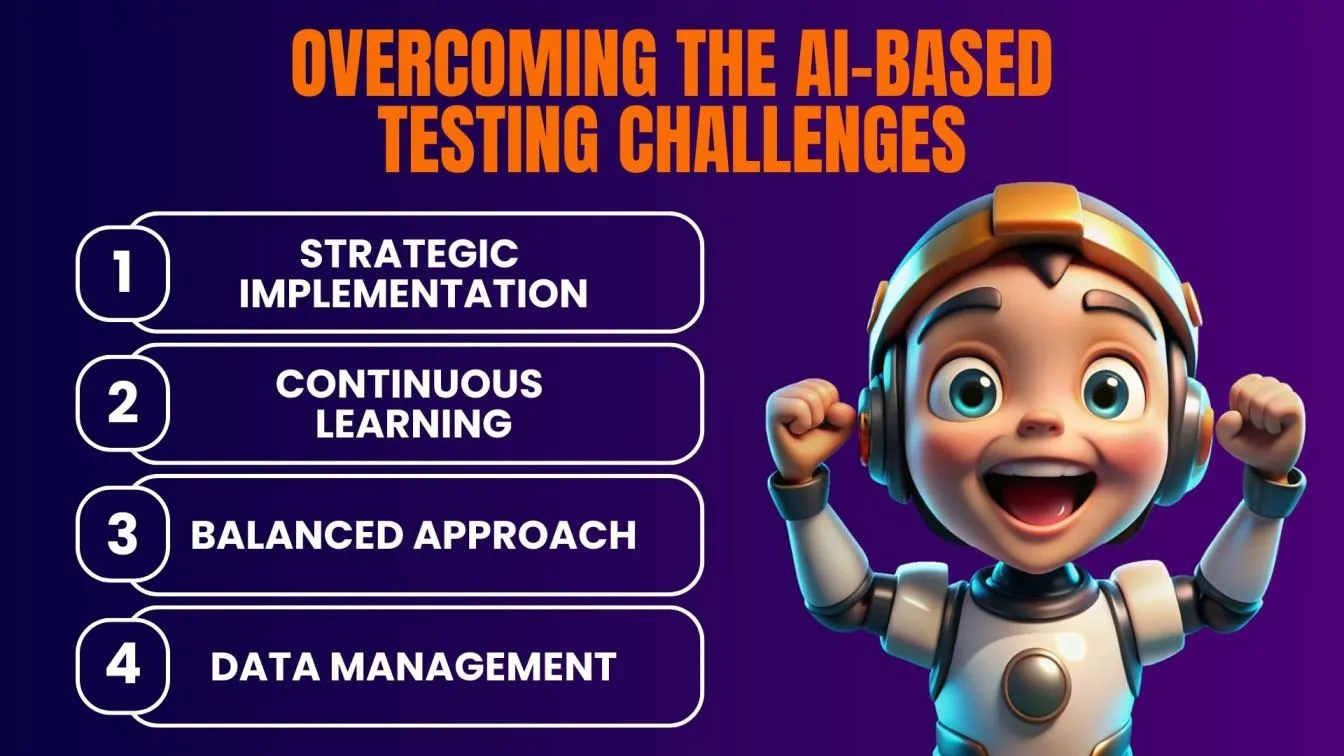
Overcoming These Challenges
- Strategic Implementation 🧭
- Phased Approach: Begin with small AI projects and scale up as proficiency grows.
- Pilot Programs: Test AI tools in pilot projects before full deployment.
- Practical Implementation:
- In an e-commerce platform, we piloted AI test automation, analyzing user behaviour to automate end-to-end testing across modules.
- Continuous Learning 📚
- Ongoing Training: Offer regular training to keep the team updated on AI advancements.
- Knowledge Sharing: Foster sharing of best practices and experiences within the team.
- Practical Implementation:
- We integrated an AI code quality tool that flagged defects, improving detection after team workshops.
- Balanced Approach ⚖️
- Complementary Testing: Use AI to enhance, not replace, manual testing.
- Human Oversight: Maintain human involvement to catch issues that AI might miss.
- Practical Implementation :
- In a banking project, AI handled regression tests, while manual testers ensured compliance, saving manual time.
- Data Management 🗄️
- High-Quality Data: Ensure data cleanliness and relevance for effective AI training.
- Compliance: Adhere to privacy laws and regulations with all data used.
- Practical Implementation :
- In a CRM project, AI cleaned and flagged data issues, improving test accuracy.
The Future of AI in Software Testing
The future of AI in software testing is bright and full of potential. As AI technology continues to advance, its impact on software testing will only grow, setting new benchmarks for quality and efficiency.
Future Trends
- More Automation 🤖
- End-to-End Automation: AI will handle all testing phases, from creation to reporting.
- Autonomous Testing: Systems will evolve to minimize human intervention completely.
- Advanced Predictive Analytics 🔮
- Proactive Issue Resolution: AI will predict and resolve issues before they arise.
- Enhanced Decision-Making: Deeper analytics will drive strategic development decisions.
- Widespread Adoption🌐
- Industry Standardization: AI-driven testing tools will become the norm across industries for quality assurance.
- Integration with Emerging Tech: Seamless AI integration with IoT, blockchain, and more.
- Enhanced User Experience Testing 👥
- Behavioral Analysis: AI will create more realistic tests based on user behavior.
- Personalized Testing: Testing will be tailored to individual user profiles.
- AI-Driven Continuous Improvement📈
- Self-Learning Systems: AI will continuously learn from outcomes, enhancing accuracy and efficiency.
- Adaptive Testing Strategies: Real-time data will dynamically adjust testing strategies.
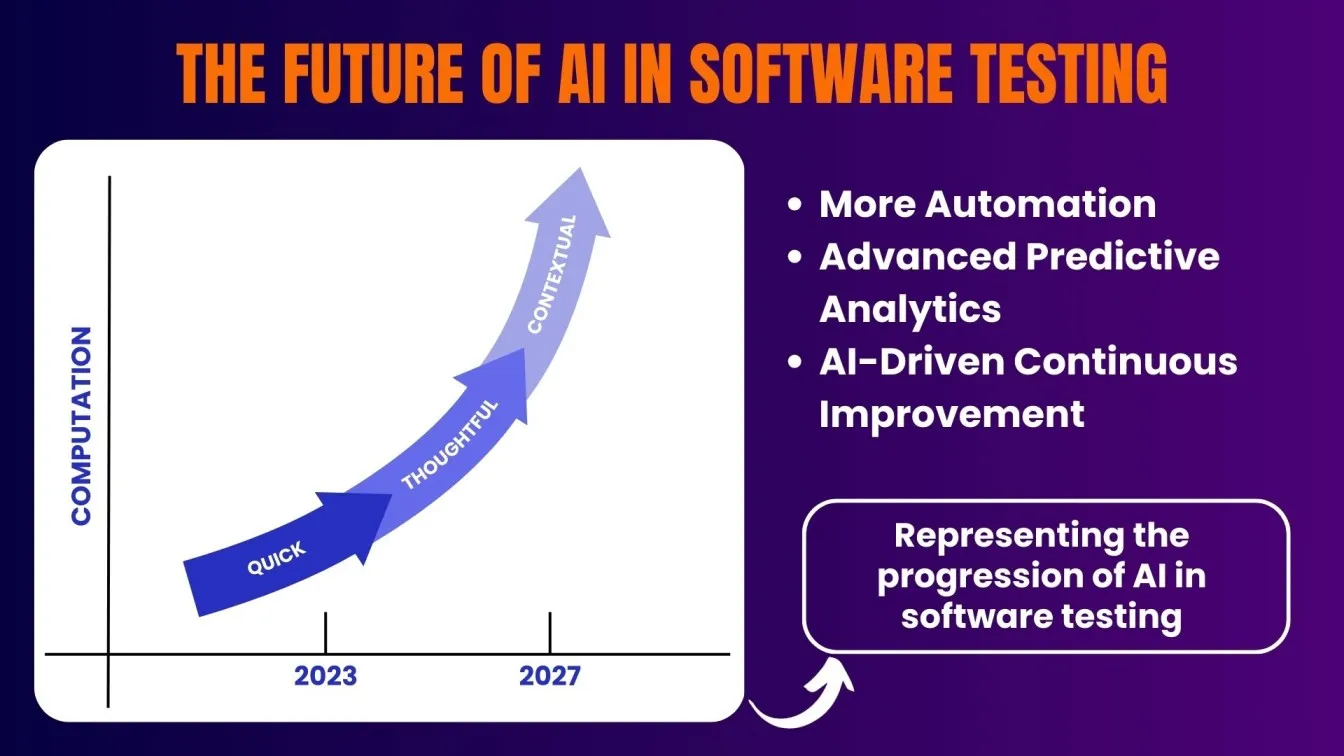
Long-term Implications
- Higher Quality Product: AI will enhance every aspect of testing, leading to superior software quality.
- Cost Efficiency: Faster testing cycles and reduced manual efforts will save costs.
- Innovation Enablement: Teams can focus more on innovation, driving greater creativity.
Conclusion
AI-powered tools are revolutionizing software testing with unmatched efficiency, precision, and speed. By automating repetitive testing tasks and enhancing software quality, AI accelerates release cycles and ensures reliable, high-quality delivery.
For successful AI implementation, a strategic, balanced approach combining AI with human expertise is crucial. As AI advances, its role in software testing will expand, setting new standards and driving industry innovation.
AI-powered testing tools offer numerous benefits, including faster release cycles and a proactive approach to identifying potential defects. By integrating intelligent algorithms within the software development process, AI-driven testing solutions ensure more efficient and accurate results than traditional manual testing methods, ultimately enhancing the overall testing process.
Embrace AI-based testing solutions to elevate your software quality and exceed user expectations! 🚀
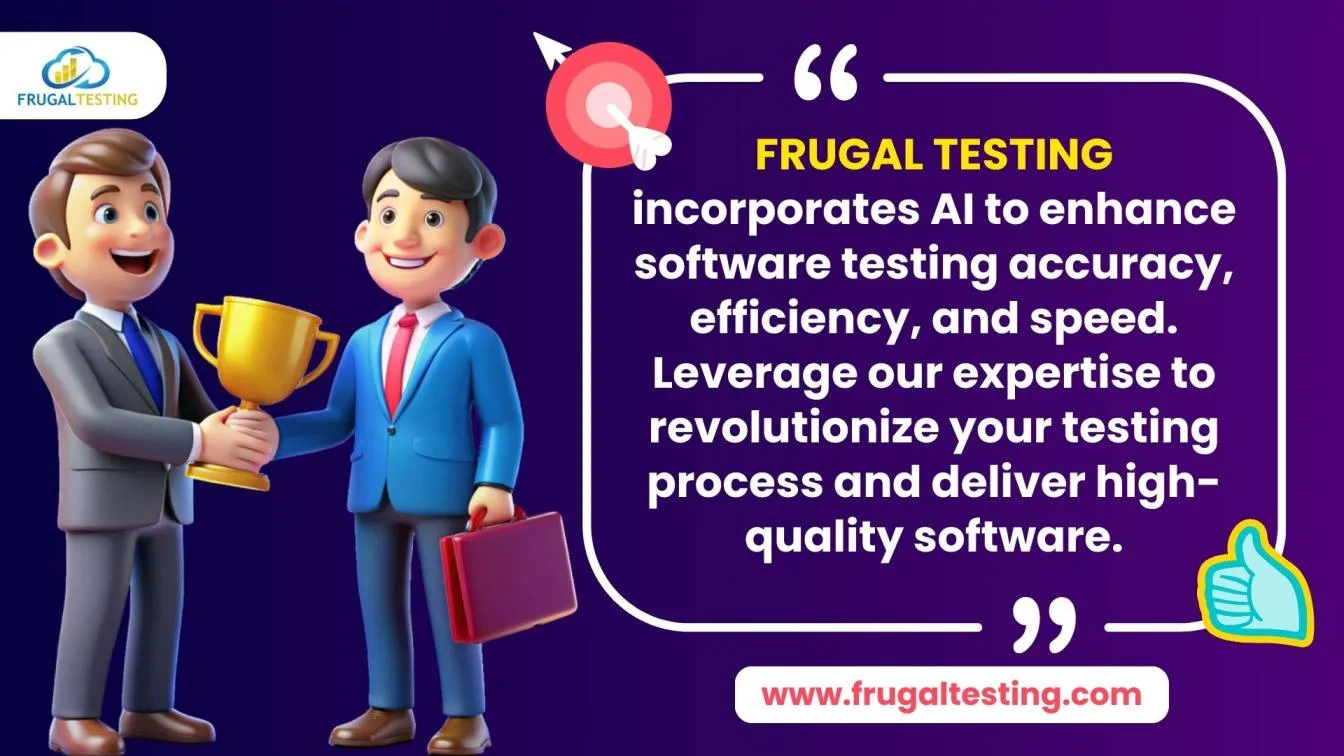
People also asked
👉 How can AI improve software testing?
AI enhances software testing by automating repetitive tasks, reducing human errors, and improving test accuracy.
👉 How to use AI for test automation?
AI can be used for test automation by generating test cases, prioritizing tests, and automating regression testing. It adapts to changes in the software, ensuring efficient and reliable test execution.
👉 How does AI differ from traditional testing methods?
Unlike manual traditional methods, AI uses machine learning algorithms to predict potential issues, automate complex testing scenarios, and improve past data.
👉 What is the scope of AI in software testing?
AI’s scope includes automation, bug detection, predictive analytics, and user experience enhancement, transforming the testing lifecycle.
👉 How to improve testing with AI?
Integrate AI tools, focus on automating repetitive tasks, and use AI for predictive analytics and anomaly detection to ensure comprehensive coverage.



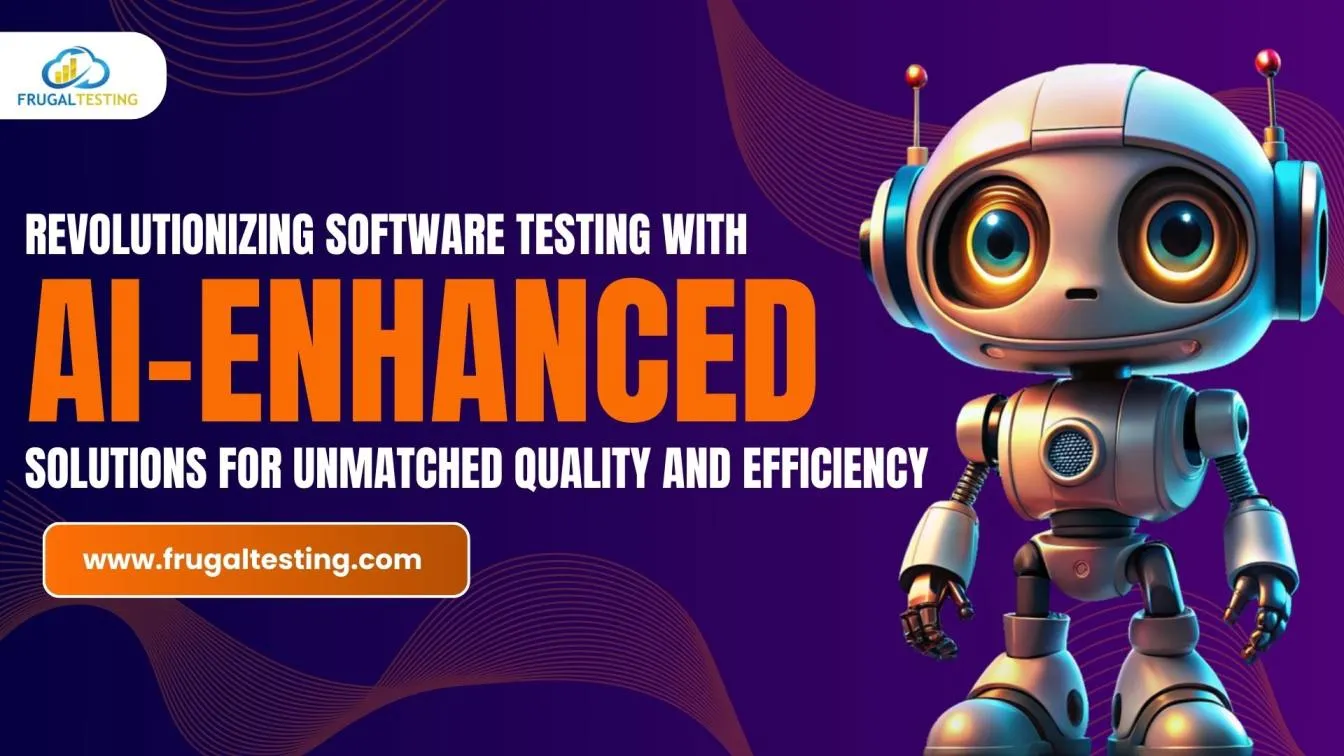

%201.webp)
